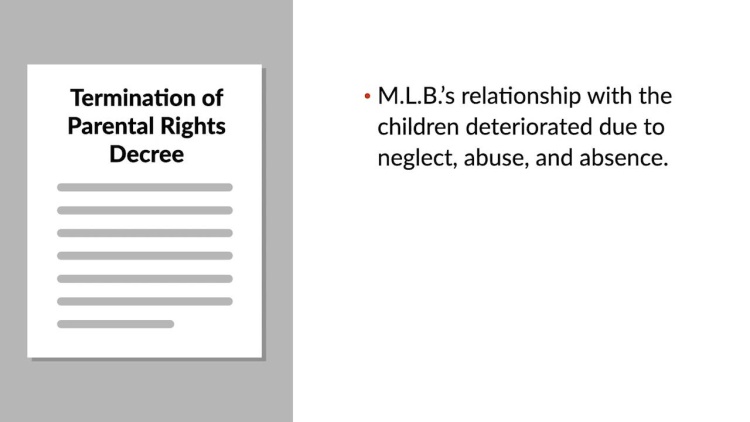M.L.B. v. S.L.J.
United States Supreme Court
519 U.S. 102, 117 S. Ct. 555, 136 L. Ed. 2D 473 (1996)
- Written by Abby Roughton, JD
Facts
M.L.B. (defendant) and S.L.J. (plaintiff) were the biological parents of two minor children. M.L.B. and S.L.J. divorced, and S.L.J. retained custody of the children with M.L.B.’s consent. S.L.J. subsequently remarried and brought an action in Mississippi Chancery Court to terminate M.L.B.’s parental rights so that the children could be adopted by S.L.J.’s new wife. M.L.B. opposed terminating her parental rights, but the chancery court ultimately entered a decree terminating M.L.B.’s parental rights and approving the children’s adoption. M.L.B. filed a timely appeal of the chancellor’s decision. Under Mississippi law, appellants in civil cases were required to prepay a fee to cover the costs of ordering and preparing relevant portions of the trial-court record and transmitting those materials to the appellate court. Mississippi claimed that the law was necessary to offset court costs, though very few civil appeals in Mississippi involved the termination of parental rights. The chancery court assessed a record-preparation fee of $2,352.36 for preparing the record relevant to M.L.B.’s appeal, but M.L.B. was unable to pay that amount. M.L.B. sought leave to appeal in forma pauperis (i.e., as an indigent person), but the Mississippi Supreme Court denied M.L.B.’s application and dismissed M.L.B.’s appeal. The United States Supreme Court granted certiorari.
Rule of Law
Issue
Holding and Reasoning (Ginsburg, J.)
Concurrence (Kennedy, J.)
Dissent (Thomas, J.)
What to do next…
Here's why 907,000 law students have relied on our case briefs:
- Written by law professors and practitioners, not other law students. 47,100 briefs, keyed to 996 casebooks. Top-notch customer support.
- The right amount of information, includes the facts, issues, rule of law, holding and reasoning, and any concurrences and dissents.
- Access in your classes, works on your mobile and tablet. Massive library of related video lessons and high quality multiple-choice questions.
- Easy to use, uniform format for every case brief. Written in plain English, not in legalese. Our briefs summarize and simplify; they don’t just repeat the court’s language.





